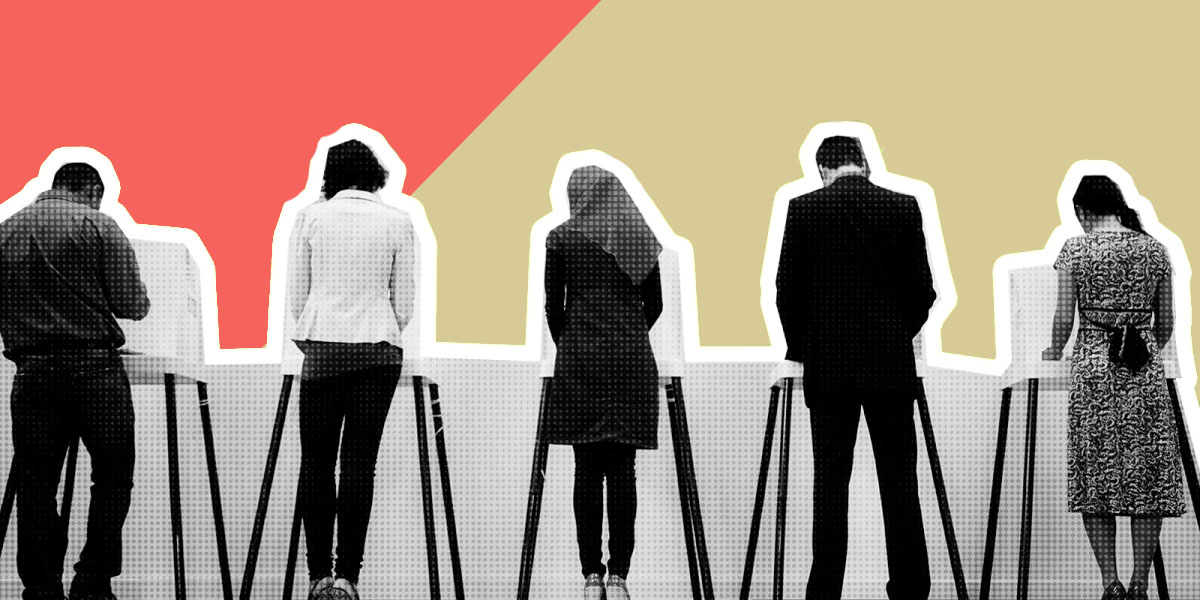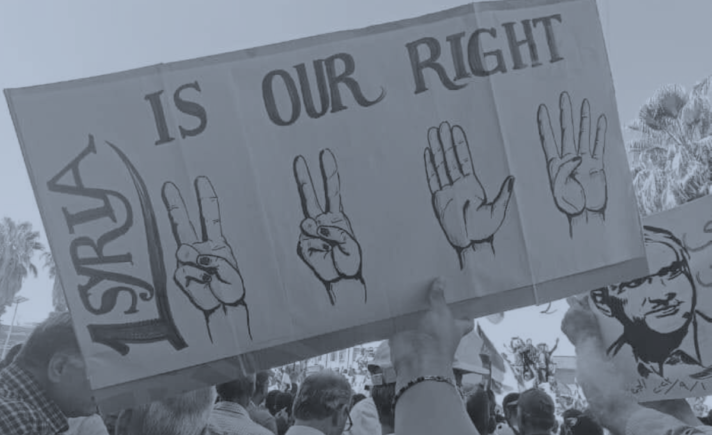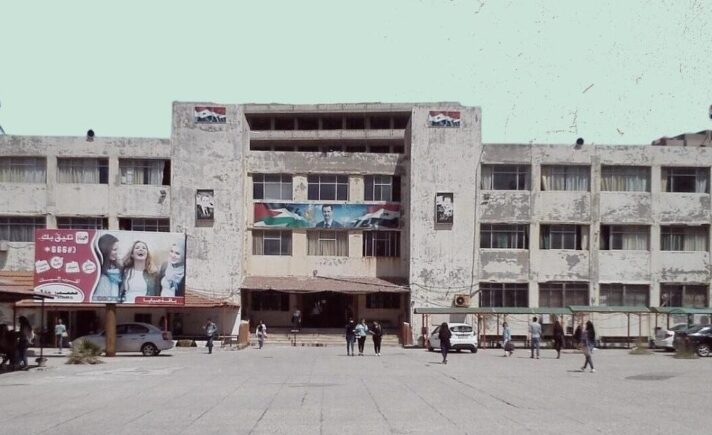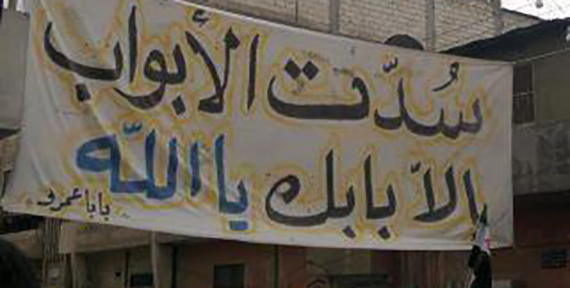[Editor’s note: This article was published on Al-Jumhuriya Arabic on 23 September. It is also available in Arabic.]
Germany’s federal elections will be held this weekend, nearly six years after the arrival of the largest wave of Syrian refugees in 2015. Having obtained German citizenship, thousands of Syrians will be able to participate in democratic elections for the first time in their lives. Polls show that Syrians make up the second largest group to acquire German citizenship in 2020, with the number of naturalized Syrians increasing by 75% from the previous year to reach 6,700.
It may seem like standing in front of ballot boxes would be a romantic moment for Syrians who have been deprived of their right to vote for decades, but it is also a moment in which all truisms and platitudes collapse, and a real moral test presents itself to the scattered diaspora of a torn country. Moreover, it is a moment that cannot be separated from decades of dictatorship. It would be unreasonable to expect the choices of Syrian voters to be unaffected by a prolonged denial of democracy. The question of which party we will vote for is inseparable from questions of identity, religion, and the past; it’s also inseparable from other major issues related to politics, ethics, ideology, identity, and alienation. Syrian communities in Germany are political in every sense of the word. Following opinion polls and listening to Syrians discuss elections should rid us of the illusion that Syrians will vote as “Syrians.” These sources indicate that their choices will be much more complex and nuanced than any ready-made expectations or standards we have for the following question: how will Syrian refugees vote?
This article does not seek to celebrate the Syrians who will exercise their right to vote in Germany, or to speak for those Syrians who can participate in the German elections. Nor does it attempt to answer the questions of who Syrians will vote for and what their demands are. Rather, this article is an attempt to capture the thinking and priorities of a random group of Syrian refugees and migrants, all under the age of forty, who arrived in Germany by various means during the last decade.
Conflicting Emotions
Ahmad Hawija arrived in Germany in the fall of 2014. He learned the language and worked for 6 months as a volunteer translator in refugee camps, after which he obtained German residency in the spring of 2015. Ahmad worked hard to find a place for himself in the labor market, and despite losing his papers and certificates, he was able to find a job in an electrical appliances company in Dusseldorf. Six months later, Ahmad was able to run the business on his own, and assumed responsibility for managing an entire team.
Ahmad is interested in world politics, particularly in the United States and Germany. These days, he is particularly concerned with the debates and electoral plans of German political parties. During his 6 years at the company, Ahmad was dedicated to following political affairs, taking advantage of his routine work to listen to political podcasts.
Today, as a German citizen and taxpayer in a country to which he feels he belongs, Ahmad feels real joy about this election: “I am really very happy. I even started listening to the debates, and I really enjoy it. Today, I can participate. I mean, I feel like a young man who watched pornography all his life, and is only now getting married.”
As for Mihyar Shammas, who studies computer engineering at a university in North Rhine, it is not joy that describes his feelings. A few days ago, Mihyar opened his mailbox and found an envelope from the municipality. When he opened the envelope he found ballot papers. Mihyar filmed the moment and shared it on social media. He says in his strong Hourani accent, “it was strange to see this many people, especially Germans, express happiness that I was able to vote. Other people are happier than I am about me being able to cast my vote. Everyone wants to congratulate me.” For Mihyar, filling in the paperwork and choosing a party to vote for was both a challenge and a responsibility: “I was surprised that people expected me to be absolutely thrilled. The truth is that – no, what I feel is a sense of responsibility and duty.”
Like many young people who initially focus on self-actualization in their new surroundings, Mihyar did not give much of his time to the country’s politics. He was familiar with the broad outlines of what was happening, but his main focus was getting himself and his family back to the zero line, as immigration and war had pushed him into the negative. Mihyar arrived in Germany 7 years ago, and obtained German citizenship in the second half of 2020.
“Once I joked in front of my German friends that I did not want to vote, because I found the process too complicated. I remember they gave me looks that made me take back what I said and apologize!” For Mihyar, voting in elections was not a form of longed-for freedom, but a tax he had to pay in order to maintain the free and democratic society in which he had arrived and obtained citizenship.
For Whom Shall I Cast My Vote?
The process of figuring out which party deserves one’s vote is not easy in Germany, where there are dozens of parties and the method of counting votes – with all its related complexities – is not easy to grasp. For many, this year’s elections in Germany present additional challenges as compared to previous cycles.
Jamil Aliyu feels that this year’s German election is the first of its kind in decades: “Merkel will not be Chancellor. There is a shift in the political spectrum and increasing polarization. Parties that were in the center are moving to the right, and leftist parties are moving further left.” Jamil’s decision to acquire German citizenship was made just a few days ago.
Soon after he arrived in Germany, Jamil started doing social and political work. He quit the energy engineering program in which he had spent years studying, and began studying community work in the field of immigration and integration instead.
In his town of North Rhine, Jamil joined Train of Hope, an organization composed of immigrants, refugees, and Germans that seeks to consolidate pluralism in the society and enable immigrants and refugees to participate in political and social life. Jamil’s activities helped him to establish himself in his location, and he would later be nominated to the organization’s Integration Board.
“One of my annual rituals, even before I got permanent residency, was to answer the Wahl-O-Mat questionnaire in order to figure out which party represents me.” This website, designed by the Federal Agency for Civic Education (BpB), offers a series of questions about a variety of topics related to Germany’s domestic and foreign policies, designed to determine where one stands on the political spectrum. This helps voters vote – not based on their loyalty to a given party, but according to the stances they adopt regarding certain issues.
Mihyar told us about similar steps he took when he tried to find out which parties represented him by answering questions on an app called Voteswiper, and by watching videos that explain the electoral programs. Mihyar’s sense of the importance of his vote, coupled with the time limitations he faced, prompted him to try and get as much information as possible in the shortest time: “In the end, the biggest influence on which party I chose was my German friends whom I trust and whose orientations I respect.”
This time around, Jamil does not feel fully persuaded by any of the parties, so he must choose the lesser of two evils. The positions held by the party’s prominent leaders on the Palestinian cause, as well as their absolute support for Israel at the expense of Palestinians, alienated Jamil from the Green Party (die Grünen). This does not mean, however, that other parties are more supportive of the Palestinian cause. The Green Party claims to support people’s liberation movements and oppressed peoples everywhere, but during the recent Palestinian uprising, many of the party’s leaders declared absolute support for Israel and did not stand for the rights of the Palestinian people. Jamil sees the Green Party as using the Palestinian cause to win votes in a way that made him decide against voting for them: “The most painful blow to me was when the Green Party nominated a naturalized Syrian youth for Parliament. The young man was later forced to withdraw his candidacy, and he was not given the necessary support. Here, I thought, is this political stupidity on their part, or is it a ploy to obtain political gains they will never fully benefit from afterwards?” Jamil believes that this event affected the youth of an entire community, “because no one felt taken seriously anymore.”
It’s More Complicated Than That
Unfortunately, applications that help voters choose among parties are not enough, not even a deep plunge into electoral platforms is enough. There are other factors that play a role in choosing to vote for a party.
When Rashad Lulu initially tried to find out which party best suits his political and economic orientation and vision, his first choice was the liberal Free Democratic Party (FDP). Rashad arrived in Germany in 2014 as a student. He took the preparatory year in North Rhine-Westphalia, and then moved to northern Germany to study engineering. After graduating, Rashad started working for a measurement and control devices manufacturer. Eventually, German citizenship granted Rashad the degree of freedom he needed for financial affairs, as he could not deal in trading and investments when he was a refugee.
Rashad’s awareness of the importance of financial independence and investing began early: “The fact that Germany is a rich and economically powerful country does not mean that we will be financially comfortable after we retire, or that we can trust the existing social security system in the future.”
Rashad learned the importance of money management and saving from his father, who was a trader by profession. Rashad does not feel confident that the state will provide him with a decent life when he reaches retirement age. German Finance Minister, Vice-Chancellor, and candidate with the Socialist Party, Olaf Schulz, stated in an interview that he does not invest but puts all of what remains of his salary into a daily savings account that accumulates no interest. After hearing this statement, which Rashad considers to be extremely flawed coming from the Finance Minister of the strongest European economy, he rethought his vote for the Social Democratic Party led by Schulz. According to Rashad, one of the ABCs of investment is that money that is not invested will lose value in the future.
Rashad believes in the values advocated by leftist parties, but in his opinion the problem with these parties is that their policies for managing the economic system depend on short-term solutions and have bad long-term consequences. Rashad does not believe that the methods they are using in their quest for social justice and the betterment of the middle class will work in the long run. When he read the FDP’s electoral platform, he felt that their presence in the government alongside the Green Party, for example, could steer the state onto a better economic path.
Over time, it seemed to Rashad that the history of the FDP contained no real tests of their principles and platforms. As he increasingly follows things more closely and participates in discussions with a number of his friends, it is becoming clear to Rashad that voting for the FDP is not a sound option at this stage.
The Best Available Option
Opinions about the parties running for election vary, but all those we interviewed have one thing in common, none of them is completely convinced about the party for which they will vote. Their voting choices are based on one principle: to vote for the best available option. There is a marked state of anticipation and sense of urgency about closing ranks and voting for promising parties.
Shams, who chose not to reveal her real name, arrived in Germany in 2010. She now lives in Saarland in southern Germany, with her daughter and husband. She studied economics and works at a local company. Shams participated in the 2017 elections, and her happiness at the time was indescribable.
Shams never voted in Syria, but she did go along with her mother to the polls. She recalls what that day was like and compares: “I remember that everyone saw who you voted for. Of course, the votes were all known in advance. I even remember that they took my mother’s card from her and voted for her.”
The 2017 elections in Germany were not easier than this year’s for Shams, but her feeling was lighter and lovelier: “Back then, I was new to the country and all the parties were new to me. In the past couple of years, I have gathered a lot of information about them, and I feel like I know more.”
As Shams participates in the elections today, she is mainly thinking about her little girl. Despite knowing the German parties and having gained an in-depth knowledge of the country and its culture, Shams is not enthusiastic about this election. For her, none of the options are ideal. Thus, voting today is nothing more than choosing the best option available so that it can be strengthened in the face of the extreme right. According to Shams, “the country today is in a state of polarization, and the whole society has changed. Before, I didn’t experience any racist incidents, but after the second wave of refugees, this changed, and it makes me afraid for my daughter. I want her to be raised in a society in which she isn’t subjected to racism.” This motivates Shams to choose one of two parties, either the Green Party or the Socialist Democratic Party (SPD).
As for the minor parties, Shams thought about voting for one of them. She felt, however, that today the larger parties need to strengthen their position against the extreme right, especially as the country is increasingly divided between right and left, and following the COVID-19 crisis. She chose to focus on the larger parties so that this country could get through this stage in its history safely.
We see the same thing with Nadine Jodi, who feels that after living in Germany for 9 years she has become more familiar with the country’s parties and their histories, and more selective about her vote: “In 2017, I was very happy about the elections, and glad that I could vote. It was a mix of feelings. For instance, I felt like I was casting my vote in defiance of the Syrian regime. I also remember that I was happier with the idea of having a vote than with whoever I was voting for.”
Today, Nadine thinks about which party deserves her vote, and thinks again. “Ultimately, I will not vote for the ideal party, but for the best party that there is,” she says. Nadine studied sociology and media communication. During her studies, she delved into political science, where she learned about the different parties. She also learned to read electoral plans with the requisite care and skepticism.
Nadine thought about the minor parties; “In my opinion, with time we should start thinking about the minor parties and give them more support, so that they can grow and enter Parliament. If we always vote for the major parties, we will never give small parties, which may be very promising, the chance to succeed.” But fear of the future pushes voters to choose that with which they are familiar. In Nadine’s words: “In 2017, we had the courage to vote for small parties. This time around, the country’s general atmosphere is pushing us to return to what we know. This is unfortunate, and a mistake, but that’s what the general atmosphere here is like.”
One small party, Volt, caught Nadine’s attention with its youthful and lively appearance. The party is a pro-European progressive movement that aims to make politics more transparent and strives for a united, equitable, and open EU that provides opportunities for all. After a little research, Nadine felt alienated by its clear Eurocentrism; “that was enough to turn me away from that party.” The Team Todenhöfer party also caught Nadine’s eye with its unique media campaign. The party was founded in 2020 by Jürgen Todenhöfer after he left the The Christian Democratic Union (CDU). The party’s main focuses are its peace policy, which demands an end to all German military operations abroad; improving social climate policy; and supporting the younger generation. The founder of the party markets himself as wanting to pass the knowledge he has accumulated on to the next generation. The party sheds light on issues of racism and Islamophobia. Nadine says that the main thing that caught her attention was that “the party’s political language is not a classic Western language. It’s a language that is close to the people and the streets, especially immigrants. The party also doesn’t just harp on about problems, it suggests solutions. Unfortunately, that is something missing even from the Green Party.”
After following-up, however, it became clear to Nadine that Todenhöfer uses a populist rhetoric to call for the people’s rights and the rights of oppressed groups, but he always centers himself and is thirsty for the spotlight: “Todenhöfer talks about immigrants and shows support for them, but I feel like he’s also climbing to fame on their shoulders.”
Immigration and Syria in Germany’s Elections
For many Syrians who have obtained German citizenship and the right to vote, issues relating to Syria and immigration are central to their electoral choices.
Mohammad Nanaa leans towards the Green Party because of their decisive stance against deporting Syrians, Afghans, and Iraqis, including those who have committed crimes. For Mohammad, this is a crucial issue: “I noticed, for example, that my German friends, even those who support pro-immigrant policies, are not very interested in these issues. I think that our experiences determine our orientations – my friends didn’t go to Greece and see 700 refugees crowded into a single place, with a sea in front of them, a war behind them, and an uncertain future in their eyes.”
Mohammad contemplates, “of course, I’m interested in the environment. Maybe if I see and read more about the environment, it will become a top priority for me. But I am visiting Greece right now and I’m seeing refugees – the environment is not my biggest concern.” Muhammad is silent for a while, rethinking his words and his motives for the election. “Maybe with time,” he says, “as my stay in Germany lengthens, my list of priorities will change. Maybe it’s because I was an immigrant in this country for longer than I’ve been a German citizen, so I think more about immigrants, not Germans.”
Mohammad obtained citizenship about 9 months ago. He is based in Berlin and works with R3SOLUTE, a non-profit concerned with empowering refugees to manage conflicts in their communities. In his view: “I am a person who speaks German, and this grants me a voice, so I use it to promote issues affecting those who don’t have one.” Obtaining citizenship and the right to vote had made Mohammad feel an even greater responsibility – his vote must speak for many who don’t have the right to vote: “It’s important to me that the party I vote for will not legitimize the Assad regime, and that it stands with refugees and against their deportation, even if they commit crimes in their country of asylum.”
At the same time, Mohammad feels that his past in Syria determines his view of the political parties, albeit on an emotional level: “I feel like something inside me refuses the left. Maybe it’s their radicalism. Maybe it’s something inside me that links communism with backwardness. I think that it’s the Ba’ath Party that causes my distaste for the left. Just thinking about them gaining power makes me feel like the world has darkened and I’m in a poor, communist country.”
As for Nadine Jodi, her electoral priorities are not limited to issues of immigration and asylum – she also thinks about each party’s foreign policy. For example, the export of arms sold by Germany to conflict zones is a crucial topic for her, and central to this election.
As for Ahmad, he is trying to vote for candidates that will benefit Germany in general, without necessarily viewing things through the lens of asylum or the issue of Syria. According to Ahmad, “If Germany is fine, those coming to it will be fine. For me, when I go to vote, I think that the party that wants to govern needs to be focused on the final destination. Politics is like driving a car; to reach your destination, you need to be balanced and distribute your attention.”
Ahmad supports the Socialist Party, even if this means that individuals will pay more taxes. He also believes that it is very important to think about the economy if we want what is in the country’s best interests: “Like any citizen, it’s important to me that prices do not go up and inflation doesn’t happen. It’s very important that my retirement pension is enough for me. Looking for a party that meets all my requirements isn’t easy at all.”
Discussions about the German election and opinion polls on Syrian Facebook pages reveal many divergent opinions, and perspectives that challenge widespread assumptions. Some refugees who arrived in Germany through illegal immigration reject the Green Party and the Socialist Party, and express their fears of allowing Afghan immigrants in, “lest Germany turn into Kandahar.” Others express their readiness to vote for the extreme right instead of voting for the Green Party, because the latter “encourages same-sex marriage.” Others are hostile to the social security system because it forces them to pay those very same taxes from which they previously benefited. Others abstain from voting because they do not want to make an effort to understand the country’s politics, or because they feel that voting is a lie and that the parties are all alike, run by a massive conspiracy. The moment of standing behind the ballot box is not necessarily a festive one – it is also a challenge and test for a diaspora community that lived through decades of dictatorship, and left behind war and a devastated country.
In a recent paper on the Syrian diaspora in Germany, German journalist and expert on Syria and its diaspora, Kristin Helberg, addresses the issue of Syrian political participation and self-organization. In her interview with Al-Jumhuriya, Helberg states that, “the moment of participation in parliamentary elections is certainly an important one for the Syrian diaspora, but it’s neither a priority nor the most important event for us to talk about.” Helberg believes that we must focus on investing in the political education of Syrians and their effective inclusion in the country’s existing democratic structures.
“It frightens me that countless hours are spent teaching people information they can find on Google instead of educating them politically and encouraging them to look for democratic representatives of their own views and interests.” Helberg notes that if you observe Syrian communities in Germany you will notice that old ways of thinking and living still dominate. This is natural. The Syrian people are accustomed to not trusting the state or its politicians; they are also accustomed to relying on themselves and their network of relations to manage their affairs. Dismantling and replacing ways of thinking takes time and organized work.
Jamil shares Helberg’s opinion: “What I see is very sad and frustrating. We Syrians need many years of concerted civil and political work in order to be able to act in a democratic manner. The tribal instinct still controls us.” In his work with Train of Hope, Jamil sees that developing political thought and democratic education is an urgent necessity. He also sees that it is very easy to win votes by playing with emotions without any electoral platform or real efforts, and without any accountability: “I must be held accountable. Even the people who voted me into the integration council, none of them have asked me what I’m doing.”
On the other hand, Helberg criticizes integration courses, and considers their focus – providing refugees with general information they can find on their own – misguided. Especially in light of the fact that there is an urgent need for integration courses that involve refugees in civic life through their interests, needs, and the details of their daily lives. In her words: “What refugees should learn is not only the names and flags of parties, but how to reach their goals and how to move within democratic frameworks. Refugees need to know how to search for people who represent their views and interests in a democratic manner, and not through Abu Abdo or Abu Ahmad whom they know here or there.”
Helberg notes a gap in some Syrians’ understanding of the German socio-political system: “Some Syrians, for example, think that the German state provides a ‘salary’ to refugees rather than social security assistance. That is, they do not understand the system of social solidarity on which the state is based. This is a simple example of the lack of information that Syrians have,” which will certainly be reflected in their electoral choices, turnout, and sense of responsibility. Helberg also considers it to be important that Syrians look at the German state not as a foreign entity, but as something of which they themselves are a part, and that they can have influence in this country and be active in its social and political systems.







